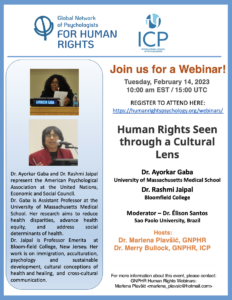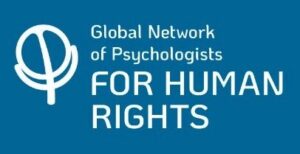
Editor’s Note
The focus in this month’s Bulletin is World Justice Day, February 20

Table of Contents
Special Focus: World Social Justice Day, February 20
- Statement from a Global Coalition for Social Justice
- ILO Declaration on Social Justice for a Fair Globalization
- GNPHR opinon piece/blog:Make a Difference – in honor of World Social Justice Day by Rosie Phillips Davis
- How to Observe World Day of Social Justice
- News on Economics and Social Justice
SPECIAL SECTION

Statement from A Global Coalition for Social Justice
Poverty and inequalities within and among countries are on the rise in many parts of the world. The economic and social crises of recent years have been exacerbated by the consequences of the COVID-19 pandemic, natural disasters due to accelerating climate change, geopolitical tensions, and armed conflicts. Beyond the human tragedies associated with them and their impact on the world of work, these crises have highlighted the interlinkages and dependencies of economies and societies around the world and shown the crucial need for concerted action to respond to them, at global, regional, and national levels.
Social justice makes societies and economies function better and reduces poverty, inequalities, and social tensions. It plays an important role in attaining more inclusive and sustainable socio-economic development paths and is key for reaching the Sustainable Development Goals (SDGs) of the 2030 Agenda for Sustainable Development (2030 Agenda), especially at a time when the achievement of those goals remains faraway.
ILO Declaration on Social Justice for a Fair Globalization
The International Labour Organization unanimously adopted the ILO Declaration on Social Justice for a Fair Globalization on 10 June 2008. This is the third major statement of principles and policies adopted by the International Labour Conference since the ILO’s Constitution of 1919. It builds on the Philadelphia Declaration of 1944 and the Declaration on Fundamental Principles and Rights at Work of 1998. The 2008 Declaration expresses the contemporary vision of the ILO’s mandate in the era of globalization.
The Declaration was updated in 2022 to reflect the inclusion of a safe and healthy working environment in the ILO framework of fundamental principles and rights at work.

GNPHR Blog – in honor of the World Day of Social Justice
The GNPHR published an opinion piece/blog by Rosie Phillips Davis, Professor of Counseling Psychology at the University of Memphis (USA) on the deep links between poverty and social justice.
News on Economics and Social Justice
Richest 1% bag nearly twice as much wealth as the rest of the world put together over the past two years. Oxfam January 16, 2023.
The richest 1 percent grabbed nearly two-thirds of all new wealth worth $42 trillion created since 2020, almost twice as much money as the bottom 99 percent of the world’s population, reveals a new Oxfam report. ‘Survival of the fittest’ was published on the opening day of the World Economic Forum in Davos, Switzerland. Elites are gathering in the Swiss ski resort as extreme wealth and extreme poverty have increased simultaneously for the first time in 25 years.
The high cost of living for children in the UK. Editorial, The Lancet Child & Adolescent Health, Volume 7 (1), January 2023.
The shocking inquest findings on 2-year-old Awaab Ishak’s death in December, 2020, from a respiratory condition caused by prolonged exposure to mould in his home have highlighted the dire living conditions of many children in the UK. Concluding the inquest on Nov 15, the coroner noted poor ventilation as a contributory factor, as well as an insufficient response by the housing association responsible for the property and inadequate action by health professionals when concerns were raised.
GNPHR NEWS AND EVENTS
 GNPHR Webinar Series – Human Rights and Psychology
GNPHR Webinar Series – Human Rights and Psychology
Next Webinar is February 14, 2023, 4 pm CET
Topic: Human Rights Seen Through a Cultural Lens
View all webinars in series here https://humanrightspsychology.org/webinarseries
REGISTER HERE
Psychology Organizations and Human Rights
The Network of Human Rights Groups in Psychology Associations is open to representatives of psychology associations that have established a committee, office, or subgroup focused on psychology and human rights. If you are interested in joining the group please register your interest here https://humanrightspsychology.org/home/about/interest-form-gnphr-working-group/
CONTENT AREAS AND NEWS
General
Special Issue: Psychobiographies of Social Change Agents. Jonathan M. Adler, Jefferson A. Singer, Volume 91, Issue 1, Pages: 1- 265, February 2023.
This Special Issue of Journal of Personality, focused on psychobiographies of social change agents, aims to make contributions to the field in terms of content, method, and process. The content of the issue is focused on understanding people who powerfully impact their world, from eminent global leaders to everyday change agents. The process of curating this Special Issue sought to make several interventions in typical practices, including the cultivation of an intentional community of scholars representing both experienced and fledgling psychobiographers, the pursuit of a relational approach to publishing, and the adoption of open science practices.
HUMAN RIGHTS WATCH – World Report 2023 Introductory Essay by Tirana Hassan: A New Model for Global Leadership on Human Rights
“This is the overarching lesson of our ever-more disrupted world: we need to reimagine how power in the world is exercised, and that all governments not only have the opportunity but the responsibility to take action to protect human rights within and beyond their borders.”
also:
Why World Leaders Should Act Together to Protect Our Human Rights: (PDF):
STATEMENT American Society of Human Genetics Board of Directors On The Report of the ASHG Facing Our History – Building an Equitable Future Initiative
January 24, 2023 ASHG News, Statement Archive
The American Society of Human Genetics (ASHG)—and the research community it supports—believes in the power of human genetics to advance science, health, and society. However, ASHG and the field have failed to acknowledge, fully and consistently, the misuse of human genetics to serve unjust ends or take action to denounce such use. As the community’s oldest and largest professional society, ASHG also has been late in making explicit efforts to integrate equity, diversity, and inclusion into its values, programs, and voice. The Society affirmatively seeks to reckon with, and sincerely apologizes for, its involvement in and silence on the misuse of human genetics research to justify and contribute to injustices in all forms. It commits to sustain and expand its integration of equitable and just principles in the study and use of human genetics research, taking both immediate actions and swiftly determining longer-term goals it will set to realize the benefits of human genetics and genomics research for all.
Academic Freedom / Higher Education
Harvard Reverses Course on Human Rights Advocate Who Criticized Israel
Jennifer Schuessler andMarc Tracy, NY Times, January 19, 2023.
News that the university had blocked a fellowship for the former head of Human Rights Watch stirred debate over academic freedom and donor influence.
Are diversity statements a threat to academic freedom?
The Economist, Podcast, February 3, 2023.
Our weekly podcast on democracy in America. This week, we look at ways ideological homogeneity is spreading across campuses. MORE AND more universities across America now require would-be professors to submit so-called diversity statements. These ask applicants to set out their commitment to, and experience of, promoting diversity, equity and inclusion. At the same time some Republican-led states, most notably Florida, are putting their own restrictions on academia. How healthy is academic freedom in America?
Children/Youth
Children’s rights and the environment with a special focus on climate change. Committee on the Rights of the Child. Draft General comment No. 26, November 2022.
The extent and magnitude of the environmental harm is an urgent and systemic threat to children’s rights globally. Unsustainable extraction and use of natural resources, combined with widespread contamination through pollution and waste, have had a profound impact on the natural environment, fuelling climate change, intensifying toxic pollution of water, air and soil, causing ocean acidification, and devastating biodiversity and the very ecosystems that support and sustain all life.
The application of a child rights-based approach in the environmental context requires the full consideration of all children’s rights under the Convention on the Rights of the Child.
China: Tibetan children forced to assimilate, independent rights experts fear
Roughly one million Tibetan minority children in China have been separated from their families and placed into Government-run boarding schools, forcing their assimilation into the dominant culture, three independent UN human rights experts said on Monday. “We are very disturbed that in recent years the residential school system for Tibetan children appears to act as a mandatory large-scale programme intended to assimilate Tibetans into majority Han culture, contrary to international human rights standards,” they said in a statement.
Report of the first children and young people’s consultation.
United Nations General Comment No. 26 Children’s Advisory Team. September 2022.
The United Nations Committee on the Rights of the Child (the Committee) is listening to the calls of children and taking a significant step to hold State parties accountable for ensuring children can grow up and live in a clean, green, healthy, and sustainable world by creating a General Comment on Children’s Rights and the Environment with a Special Focus on Climate Change (General Comment No. 26).
Climate Justice
Historic compensation fund approved at U.N. climate talks.
Mithil Aggarwal, NBCNews, November 20, 2022. In a historic first, countries have agreed to set up a fund to help pay for the devastating impact of climate change on poorer nations. The fund aims to bring relief for disaster hit countries who have called for aid and reparation after enduring climate change-induced floods, droughts, heat waves and famines. Payments, for what negotiators call loss and damage, have also been an issue for nations which are at a higher risk of sinking all together due to rising sea levels.
How To Do Earth Day 2023. Build Our Only Home, Saturday April 22.
EARTH DAY ACTION TOOLKIT.
As citizens, we have the power and duty to make our voices heard. What each of us does, and how we do it, has a massive ripple effect on our ecosystems, as well as the pace of corporate and government action. Gen Z provides inspiration, with 45% having stopped buying from brands with poor ethical and sustainability practices. Through civic actions and our day-to-day life choices, we have the power to lobby for and support the businesses who actively choose eco-friendly practices and climate-friendly investments. There is no time more vital than the present to take action and INVEST IN OUR PLANET!
Freedom of Expression
Russia Legalizes Massive DNA Collection Without Oversight
Russian President Vladimir Putin signed a law extending compulsory DNA data collection to millions of people yesterday. Anyone suspected of any crime will have their DNA collected, and those convicted or sentenced to administrative detention for a misdemeanor will have their DNA profile stored in a state database for life.
This new legislation boosts Russia’s massive surveillance system and delivers another blow to the right to privacy. The government anticipates collecting DNA from at least 1.8 million people annually. In 2019, Russian courts imposed nearly one million sentences of administrative detention and 620,000 criminal sentences, which indicates the intended scope of the measures after the law fully enters into force in 2025. The administrative offences include participation in “unauthorized” assemblies, traffic offences, public intoxication, and failure to pay a minor fine.
Pakistan’s media regulator said Monday it blocked Wikipedia services in the country for hurting Muslim sentiment by not removing purportedly blasphemous content from the site. Critics denounced Islamabad’s action, saying it was a blow to digital rights.
Under Pakistan’s controversial blasphemy laws, anyone found guilty of insulting Islam or its figures can be sentenced to death, although the country has yet to carry out capital punishment for blasphemy.
Inclusion, Exclusion, Racism
Major EU survey on antisemitism and Jewish life launched.
Fundamental Rights Agency.
A major survey measuring hate crime and discrimination against Jews across Europe opened on 25 January, led by the European Union Agency for Fundamental Rights (FRA).
Antisemitism continues to be a blight on Europe despite repeated efforts to put an end to long-held prejudices,” says FRA Director Michael O’Flaherty. “FRA continues its steadfast support to the EU’s commitment to safeguard Jewish life across Europe. Once again, our survey gives Jews in Europe the opportunity to voice their concerns so that policymakers get the insights they need to effectively tackle antisemitism once and for all.”
How Discrimination Gets Under the Skin: Biological Determinants of Discrimination Associated With Dysregulation of the Brain-Gut Microbiome System and Psychological Symptoms.
Tien S. Dong, Gilbert C. Gee, Hiram Beltran-Sanchez, Xiaobei Zhang, Emeran A. Mayer, Arpana Gupta, Biological Psychiatry Journal, Open Access, October 28, 2022.
Discrimination is associated with negative health outcomes as mediated in part by chronic stress, but a full understanding of the biological pathways is lacking. Here we investigate the effects of discrimination involved in dysregulating the brain-gut microbiome (BGM) system.
Adaptation and validation of the Johnson-Lecci scale to assess anti-white bias among black UK minority group members. Alain Van Hiel, James D. Johnson, Eva Kefilwe Sekwena, PLOS ONE Open Access, November 2022.
The present study (total N = 901) set out to construct and validate a culturally sensitive instrument to examine anti-White bias among Black UK minority group members. Our novel measure of anti-White bias–which we called the AWB scale–was based upon the Johnson-Lecci scale (JLS; 2003) a questionnaire designed to measure anti-White attitudes among Black Americans.
White Americans who believe white people are poor are more likely to support welfare policies.
Personality and Social Psychology Bulletin (2022).
White Americans who think that White people are poor are more likely to believe that welfare recipients are hardworking, and to support welfare policies, according to new research. Previous studies on this subject have focused on White Americans’ beliefs that poor people are Black and the resulting dehumanization of the poor. The new research, led by Dr. Erin Cooley of Colgate University and Dr. Jazmin Brown-Iannuzzi of the University of Virginia focuses on White Americans’ beliefs that White people are poor and how that influences their attitudes toward the poor.
Migration, Refugees, Displacement, Statelessness
Resources to Support Work wtih Refugees and Stateless Persons
Explore the resources and tools designed to protect the rights of stateless refugees and prevent new cases of statelessness arising in the migration context in Europe.
ADVOCACY BRIEFING, July 2022
Palestinians and the search for protection as refugees and stateless persons in Europe
There has been progress in recent years in some jurisdictions towards an increased awareness of refugeehood and statelessness among Palestinians. However, despite this limited progress, Palestinians continue to face discrimination due to inadequate legal frameworks or discriminatory practices, and remain unable to access protection in many European countries as refugees or stateless persons (or face lengthy legal battles to do so). There are divergent approaches taken as to whether they are considered stateless persons, and five key issues are evidenced through our research.
Women
PUBLICATIONS
Voices to Refugees:
Every lemon will bring forth a child. Kelley Swain, The Lancet, November 10, 2022.
As Long as the Lemon Trees Grow, Zoulfa Katouh’s debut novel (Bloomsbury Publishing, 2022), is vivid and unflinching. It offers what the publishing industry would call much-needed representation, giving voice to the stories of Syrian refugees. “[These] people aren’t numbers. They have lives and loved ones, and maybe I helped them in the right direction,” says Salama, when reflecting on her efforts to ease the pain of anyone she encounters in the hospital.
The novel offers a multilayered view on the health repercussions of war. Salama is a health professional, working to heal those she can, or ease the pain of those she can’t heal; and she is also suffering, from malnutrition, trauma, violence, and the mental health implications of it all.
Fear of Black Consciousness
Judith Butler: “In Fear of Black Consciousness, Lewis Gordon refines our conceptual understanding of how race consciousness is made and lived, and shows how reflection and survival are intertwined for all those who suffer from antiblack racism. Drawing on the history of philosophy and on a wide range of colonial histories, African popular culture, aboriginal histories, contemporary films, and stories, he shows the critical powers of creativity in dismantling racism and the making of a world where breath and love and existence become possible.”
OPPORTUNITIES
Human Rights Award: Deadliue August 2023
International Council of Psychologists Human Rights Award
This award recognizes work being done by psychologists to advance human rights. The award is given to a psychologist or a group/organization largely composed of psychologists that has done substantial work to address human rights issues locally or globally through education, research, service or advocacy. Human rights are defined broadly and include social, cultural, economic, civil, and political rights. Deadline August, 2023.
Human Rights Award: Deadline March 15, 2023
The Neal S. Rubin /Roseanne L. Flores Student Research Awards in Psychology and Human Rights
APA Division 52, International Psychology, offers The Rubin/Flores Student Research Awards which seek to inspire students to explore and to think critically about the intersection of psychology and human rights. The awards recognize the contributions of undergraduate and graduate students in psychology throughout the world to advance human rights globally. This award has been established to encourage students to integrate human rights into the science, application and intervention models in our field. Nominations deadline is March 15, 2023.
HREA offers an online course Introduction to Human Rights Education from 5 April – 16 May 2023. This course will be taught by HREA Director Felisa Tibbitts and will introduce the international field of human rights education (HRE), including presentations of programming approaches, pedagogical practices and teaching and learning resources. Participants will be exposed to ‘the basics’ of curriculum design and develop an applied product.
Celebrate Black History Month with UN Guided Tours
The United Nations Outreach Programme on slavery and the transatlantic slave trade.
Black History Tour (60 minutes). The virtual Black history-themed tour of the United Nations will provide you a unique look at how the lives of people of African descent have intertwined with the mission of the United Nations in fields such as peace and security and human rights, with a special emphasis on decolonization. Through the lens of the United Nations and its work, the tour is a source of inspiration for the fight against all forms of prejudice, racial discrimination and social injustice.
Book online: https://fareharbor.com/embeds/book/visit-un/items/244578/calendar/2023/02/?flow=701639&full-items=yes&back=https://www.un.org/en/visit/virtual-tours&a=yes&g4=yes
Call for papers: Practicing decolonial and liberation psychologies : Deadline March 30, 2023
Submission deadlines: Letter of intent deadline: March 30, 2023, Invitation to submit will be sent out: April 30, 2023, Manuscript submission deadline: August 30, 2023
Much of the growing scholarship in this area has focused on decolonizing psychological research, methods, and theories, with significantly less attention to psychological practice and applied work in communities. In this special issue we plan to address the gaps in the literature by recognizing and sharing the work of colleagues who have consistently engaged in decolonized and liberatory approaches to mental health.
Building on the struggles against disenfranchisement, we wish to elevate community-based, culturally embedded, and liberatory healing strategies that attend to the needs and self-determination of those most impacted across the world.
Specifically, through contributions to this special issue, we hope to highlight descriptions of decolonial and liberatory mental health healing interventions. The call is guided by the following two questions: (a) what are current decolonial and liberation psychological practices in therapy and healing work? And (b) what are the epistemological approaches and evidence (including cultural evidence) supporting this work?
We encourage manuscripts adopting multiple and interdisciplinary perspectives and those that center their work within ancestral wisdom, spiritual, and cultural practices, Indigenous ways of knowing, stewardship of our natural and cultural resources, resisting oppression, and those who speak from the lens of their own lived experiences of surviving, resisting and transcending colonization on an ongoing basis.
Call for Papers | Symposium on Community, Psychology and Climate Justice: Deadline March 30, 2023
Hybrid symposium on Community, Psychology and Climate Justice on 5-7 June 2023 in Johannesburg, South Africa. Hosted by the University of Johannesburg, University of Cincinnati, and York St. John University. Selected papers will be invited to submit a chapter to an edited collection after the symposium. Brendon Barnes, Garret Barnwell, Maria Fernandes-Jesus, Carlie Trott.
The world is experiencing increasing global heating and adverse weather patterns, with associated biodiversity loss, natural disasters, displacement, migration, and negative health impacts. Psychologists, however, have been somewhat slow to acknowledge how climate change intersects with historical and contemporary injustices, including colonisation, racism, environmental health disparities, human rights violations, sexism, migration, and extractivism, to name a few. Psychologists have tended to downplay the politics of climate justice, too often adopting an apolitical stance that focuses on individual agency, attitude shifts, behaviour change and education.
CONTACTS: Published by the Global Network of Psychologists for Human Rights – www.humanrightspsychology.org
Disclaimer: The website of the Global Network of Psychologists for Human Rights (GNPHR) contains articles, events and news about the domain where psychology and human rights intersect. The information presented in this Bulletin, does not imply that the GNPHR shares the views and beliefs in the articles.
- @GNPHR1
- How to get involved – read how you can contribute to the global network
- Consider contributing a Blog/Commentary
- News and Bulletins from the GNPHR – Subscribe to GNPHR
- Email addresses:
Ways to Participate in Global Network Activities
- Student/young person representation on the GNPHR Steering Committee
Are you a student or young person (under 35 years of age) interested in joining the GNPHR Steering Committee? The GNPHR invites applications. Role description: The terms of reference broadly define the roles of all members of the steering group. Individual steering committee member tasks include : Each member will take responsibility for one of the following: (a) A specific content area or group of areas; (b) A specific project (e.g. survey of human rights reporting mechanisms; survey of educational programs in psychology/human rights, etc); (c) A specific function: for example, organizing a newsletter; soliciting commentary or newsletter blogs; seeking grant possibilities; outreach to general human rights organizations; outreach to psychology organizations or (d) Consultation: Working in collaboration with other organisations where there is a specific issue. In addition, from time-to-time, short-term subgroups may work on specific projects. In addition, for the student member, there would be a specific remit to liaise with other organisations that are focussed on younger people, psychology and human rights. Click here if you are interested in being nominated. - Share Your Experiences and Examples
One of the best ways to illustrate the intersection of psychology and human rights is through example. We are looking for examples of your encounters with human rights issues in your professional life. You might describe a time when you protected (or failed to protect) human rights, or advocated for what you saw as a human rights issue. The events might be in your clinical, research, academic, applied, or volunteer work. Please send your narrative / story (500-1000 words) to Marlena Plavšić (marlena_plavsic@hotmail.com). We will compile these for publication in the GNPHR Bulletin and on the website. Please also indicate if you would like your stories to remain anonymous. - Share your Expertise and Opinions
We invite you to contribute a blog or opinion piece on general human rights issues; human rights education or strategies for raising the profile of human rights within psychology or your professional life. Students are welcome to contribute, including on student needs for learning about and addressing human rights. Please contact the GNPHR Blog editor (blogeditor@humanrightspsychology.org) with ideas for the article you would like to write! - Send articles/news/events
If you come across a human rights article or news, or know of an upcoming hunman rights event, please send for publication in the Bulletin. Send to the Bulletin editor Polli Hagenaars (polli.hagenaars@gmail.com).

